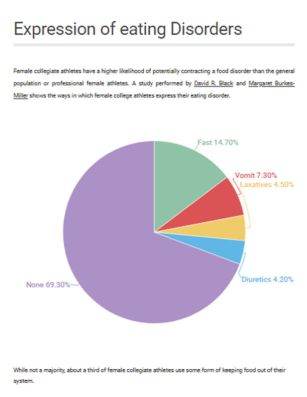While she believes the eating disorder began her freshman year of high school, it wasn’t until late during her sophomore year that she realized she had both anorexia and bulimia.
Women in western culture are pressured into looking a certain way already. However adding another dimension like sports builds the pressure for that perfect physique even more.
Kelsey Crnkovic, a junior psychology major at Cabrini University, was a tri-athlete student for her first year of high school, participating in swimming, diving and cheerleading. During her first year she had an incident with the cheerleading team. Crnkovic was told she was too big to continue being a flier anymore. She had already been struggling with mental health problems and that incident was a catalyst that caused the onset of her eating disorders.
Research done by Dr. Heather Hausenblas and Dr. Danielle Symons Downs shows that a sports setting can increase focus on weight and disease inducing eating habits.

“I told myself I would show them and I ended up tearing myself apart.”
Public stigmas and self-stigmas can become the most damaging factors to anyone who suffers from a mental illness. A study done by Danielle M. Geerling and Dr. Stephen M. Saunders defined public stigmas as usually a societal stereotype that often creates negative feelings and discriminatory behavior toward individuals with mental illnesses. Self-stigmas are when someone applies the public stigma to themselves. Self-stigmas can lead to lower self-esteem and a decreased chance of someone seeking help or get help but not benefit from it.
“Everyday I was consumed with my weight, how not to eat lunch or dinner, where to throw up,” Crnkovic said. “I would look up pictures of skinny girls as inspiration for myself.”
Crnkovic said that there was a big misconception about eating disorders and that it isn’t always just about weight. A common belief is that people who suffer from anorexia are able to change an attitude to “fix” their problem.
When her eating disorder started she found it difficult to get through practices. Classes were harder, interacting with people became problematic. She fought with her family constantly and didn’t want to be around her friends. Instead of seeking help and getting support, she spent her time drinking and partying.
Public stigmas can be confusing for people suffering from anorexia. People will be ridiculed for being anorexic but also praised for being able to control their weight. Someone who only suffered from anorexia slightly was looked at with more admiration. Major sufferers were often faced with more aggressive responses to their disorder. Neither attitude calls for the people suffering from anorexia to get help, one shames them while the other praises the behavior as something to be desired.
It affected not only her social and academic life but also her athletics. Practices became harder to finish and it didn’t feel like the sport she used to love. Crnkovic said, “Something I loved to do became more of a chore than a hobby, I swam because I knew I would lose weight if I did.”
Late during her junior year of high school Crnkovic found help and began therapy. In July she started a rehabilitation program that lasted seven months. During those months she lost time swimming and she missed classes.
“I realized I was missing a lot and I didn’t want that,” Crnkovic said. “I was lucky enough to have the support I needed to help me realize what my goals were.”
She was accepted into college not long after she finished her rehabilitation program. While her final year of high school had its ups and downs in terms of her disorder she knew that she wanted to swim in college and it helped her commit to getting better.
“It got really overwhelming.”
When Crnkovic entered college she did well, her family and friends remarked how they had missed this Kelsey. Her sophomore year was her best in terms of mental health and dealing with her eating disorders.
During her junior year in college, Crnkovic suffered a relapse. She felt that as a veteran swimmer she needed to be a role model for the incoming freshmen. Classes became harder again as did practices, but she hid her problem instead of seeking help. This led to the eating disorder slowly becoming more destructive.
It wasn’t long until her coaches and teammates realized there was a problem. Her coach told her to seek counseling and to continue to do so if she wanted to continue swimming. At that point in time her disorder had become a big health concern. Crnkovic was suspended from swimming until she was able to gain back the weight she had lost. She visited both a therapist and a nutritionist afterwards and once again realized what her goals were.
“My coach checked up on me often so I knew somebody cared,” Crnkovic said. “I know I have one more year of swimming and I don’t want to sit on the sidelines again.”


